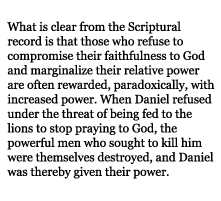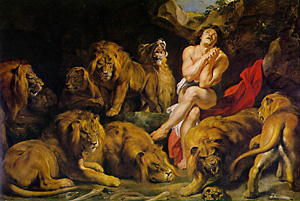OldSpeak
God's Man Will Always Win: A Christian Argument for Voting Third Party
By Joshua S. Anderson
October 21, 2004
A few weeks ago, after the first George Bush-John Kerry debate had ended and most Americans were either going to bed or switching over to Leno and Letterman, PBS ran a program called "Crashing the Parties," focusing on the grass-roots campaigns of the three "major" third parties in America'the Greens, the Libertarians and the Constitution Party. Although unlikely PBS planned things this way, the symbolic contrast could not have been more obvious; after sitting through 90 minutes of intense effort on the part of Bush and Kerry to appeal to the broadest swath of voters possible, the radical nature of these third parties only became more apparent. In general, these third parties are not merely fodder for political trivia—though there seems to be less polling strength this year, third party candidates Ross Perot and Ralph Nader each played important, decisive roles in the last three presidential elections. But slowly more and more Americans are beginning to consider voting outside the two-party box: Depending on how many voters choose a third party candidate, it remains a distinct possibility that in this election year more than one state could swing into Bush or Kerry's camp. This situation leaves some Christian voters growing impatient with the two major parties to face a deep dilemma—in such a close election, is it better to stick with a minor candidate they support enthusiastically, or might their vote be more wisely used to elect what they perceive to be the lesser of two evils? The argument against voting for a third party is familiar and well known, usually boiling down to something along the lines of not "wasting your vote." In this short essay, I will try to defend a rationale for the other side.
 |
 |
For the Christian considering whether or not to cast one's vote for a third-party candidate, we must keep in mind that our political options can hardly be limited to the powerful. After all, there are clear examples in the Scripture of God using the weak yet faithful people to defeat the strong—the stories of Israel's exodus from Egypt and Gideon's defeat of the Midianites prove this point well. God's preference for faithfulness should not be misconstrued to mean that power and faithfulness are antithetical; it is possible to be both powerful and good. What is clear from the Scriptural record is that those who refuse to compromise their faithfulness to God and marginalize their relative power are often rewarded, paradoxically, with increased power. When Daniel refused under the threat of being fed to the lions to stop praying to God, the powerful men who sought to kill him were themselves destroyed, and Daniel was thereby given their power. Clearly the Christian may pursue and support power, as well as vote for powerful men, but what he may never do is compromise his faithfulness in that support. In other words, we should never blindly or unconditionally support any political figure regardless of the power our support for them might in turn, appear to give us. Be it a particular stance on abortion, or religion, or war, all Christians must have a standard of what it means to be faithful to God. Although it is beyond the scope of this essay to explore exactly what that standard should be, I would argue that there must be some standard, and Christians must refuse to support political leaders when they break that standard?even at the cost of "marginalizing" their vote by supporting a third party. There is a point when the lesser of two evils becomes simply evil, and the Christian must have the wisdom to recognize this in our political leaders, as well as the courage to reject it.
The other, and perhaps more important reality to remember when considering our vote, is the pervasive sovereignty of God over the rulers and affairs of this world. As Paul writes in Romans 13, "There is no authority except that God has established." Ultimately, even in a democracy, it is God who rules over the elections of a nation's leaders, not men. Still, it is also true that in a democracy, we are allowed, in a way that we don't quite understand, to participate in the electing process that God is ultimately sovereign over. These dual facts have several implications—the first is that they should counter those who advise voting primarily out of fear of the "wrong" guy: Be it John Kerry or George Bush, under a rightly understood view of God's work in the world, a wrong choice is ultimately impossible. Even if we are mistaken in our voting, God's man will always win. Secondly, this renewed understanding of God's sovereignty over the democratic process allows us to begin tearing down the dividing walls between the "sacred" and "secular" areas of our lives and view voting as a task, which, like anything else, we perform ultimately in order to glorify God. For the Christian, voting is no more a completely utilitarian activity than spending 40 hours a week at a job—while both activities have an obvious tangible benefit, both deeds are avenues through which we are primarily called to our true vocation: "Whatever you do, whether eating or drinking, do it to the glory of God." The Christian should never vote primarily to get candidate A or candidate B elected, or to keep someone else from being elected in their place, but rather out of an honest desire to please God.
As I watched the PBS documentary depicting those longer than long-shot candidates discussing their policies over breakfast with the supporters whose homes they stayed in to save money on a hotel room, and then later, delivering passionate fund-raising speeches to nearly empty rooms, I was reminded of nothing so much as the words of the angel of God to Zechariah, whose prophesy of a rebuilt temple seemed nearly as absurd in his day as a third party president does in ours, "For who shall despise the day of small things?" Neither should we despise that day, and if we vote for John Kerry or George Bush, let it be out of a desire to fear and please God—not from fear of political marginalization. As it is written, in the end it is not the powerful who inherit the earth, but the meek.
DISCLAIMER: THE VIEWS AND OPINIONS EXPRESSED IN OLDSPEAK ARE NOT NECESSARILY THOSE OF THE RUTHERFORD INSTITUTE.


